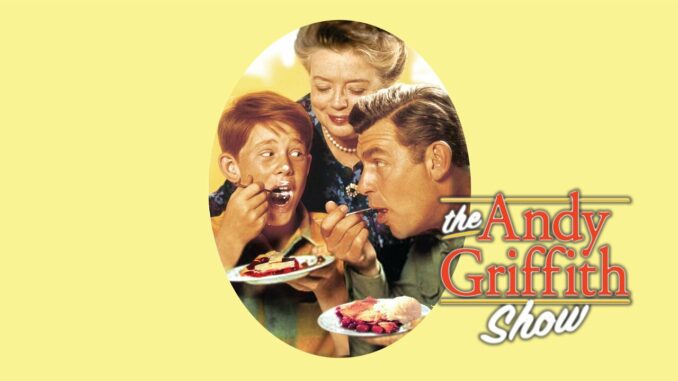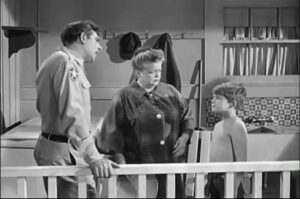
Jan. 1—”You got a uvula.”
What’d he say ?
“They got a uvula.”
Pardon me ?
“I got a uvula, all God’s children got a uvula.”
Karen Knotts never knew what she would hear on the other side of door when her dad was going over his lines for “The Andy Griffith Show.”
Her famous father was Don Knotts, the comedic actor from Morgantown who won five Emmys for his portrayal of bumbling Barney Fife on the landmark 1960s sitcom.
“In a lot of ways, he was like a classical musician, ” she said, of her dad, who died in 2006.
“He would rehearse and rehearse. He would drill those words until he got the right inflection and the right nuance.”
“Nuance, ” was the watchword for the show that portrayed the lives of the denizens of Mayberry, the fictional town in North Carolina modeled after Griffith’s real hometown in that state.
While the show had its slapstick moments — most of them courtesy of Don Knotts, his daughter proudly notes — it was never silly. It never played too broadly.
“That’s because of Andy, ” she said.
“It was because of the sharp writing and all those great actors.”
The above lines, for instance, were from one of her dad’s favorite episodes, “Barney and the Choir.”
In that one, all Mr. Fife wanted to do was join Mayberry’s musical, community assemblage.
The only trouble was, the tone-deaf deputy couldn’t carry a tune — not even in a bucket with reinforced handles.
And no one had the heart to come right out and say it.

“That was sweet, ” Karen Knotts said.
“They didn’t want to hurt Barney’s feelings. Those characters genuinely cared for one another. That’s how they were written.”
Plywood magic That’s why his daughter wrote the book on her dad.
“Tied Up in Knotts ” is her take on her dad’s life and times on the Mayberry soundstage and beyond. You’ll find it online at a most major booksellers. She wrote it last February. It was born of her one-woman show of the same name.
In fact, she has appearances lined up in Morgantown this February and March, where she’ll perform it again.
As a child, she often accompanied her dad to work on the CBS backlot where a whole town was created.
“Mayberry looked so ‘real’ on TV, ” she said.
“Especially on black-and-white TV. Then you get there and you see it’s fake, with all the plywood and cardboard cutouts.”
The actors were real, though, she said.
She remembers stopping in her tracks the first time she saw Aunt Bea light up a cigarette between takes.
Frances Bavier may have played the pious relative who kept house for Andy and Opie, but in real life, she was savvy and tough — having made her name on the New York City stage before TV lured her to Hollywood.
In contrast, Jim Nabors was as generally goofy and playful offstage as his Gomer Pyle character.
She became fast friends with the aforementioned Opie, the ginger-haired thespian Ron Howard, who played Andy’s son.
“We were the same age, ” she said.
“I never knew a kid like Ronny before, ” she said, of the child actor who is better recognized as a movie director these days. “I mean, he was still a little boy, but he had a certain gravitas about him.”
Howard used to take her on behind-the-scene tours of the set, she remembered.
He pointed out all the shoes nailed to the floor as pranks.
And the dart board, where a certain sheriff and deputy pitched matches when their characters weren’t in the script.
The real star of the show, she said, was the collective work ethic on set.
“My dad was a serious actor who happened to do comedy.”
Opening act Like that Mayberry soundstage, Don Knotts brought things with him to New York and Hollywood that people didn’t always see, either.
He grew up rough in Morgantown, where he was born in 1924. His father struggled with mental illness. His mother struggled with the checkbook, as she worked to keep the household going.
At Morgantown High School, where he graduated as senior class president in 1942, he reinvented himself.
It was at MHS, where “Jesse ” Knotts, as he was then known, found out he could be popular. He could make young ladies laugh and even go out with him.
There were assemblies, plays and football games.
There was swing music on WAJR, Humphrey Bogart movies at the Warner Theater and Saturday nights at the Rainbow Garden in Dellslow, where a guy could take his best girl on a date for just 25 cents.
There was also World War II. Knotts and a lot of his classmates were soon in uniform. He shipped out to the South Pacific, where, in between the fighting, he found time to entertain his fellow troops with a ventriloquist act.
The second half of the act, he said, was “accidentally ” tossed overboard one night — “The dummy was getting all the laughs, ” the actor once admitted, ruefully.
After V-J Day, it was Morgantown and WVU on the G.I. Bill. And marriage to his first wife, Kay. Together, they produced Karen and her little brother, Tom.
